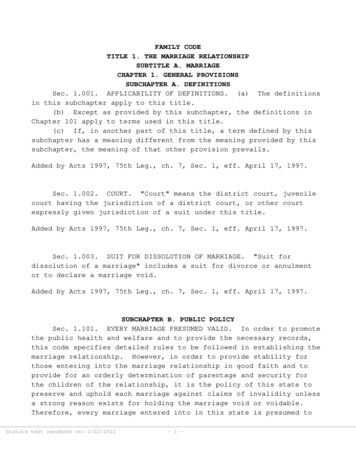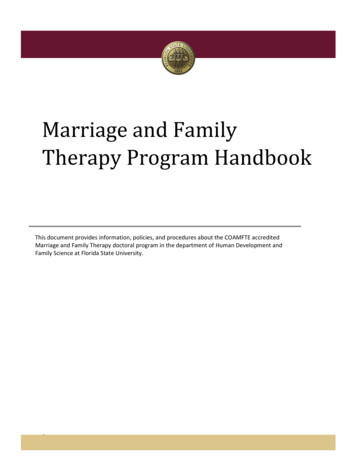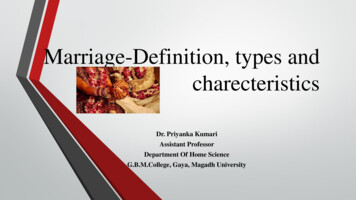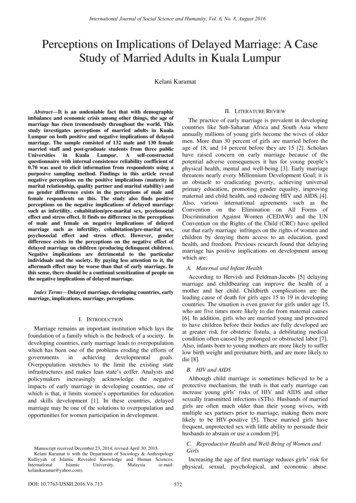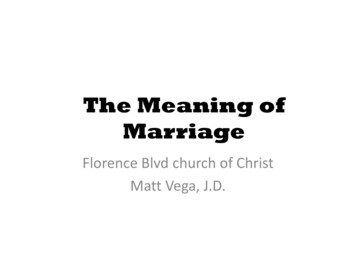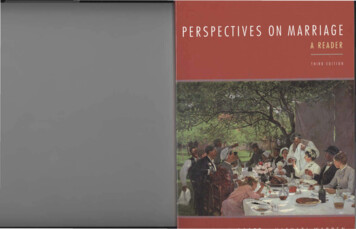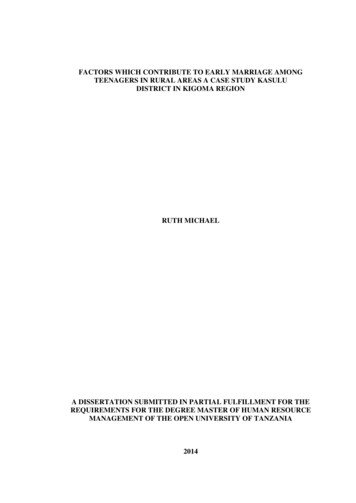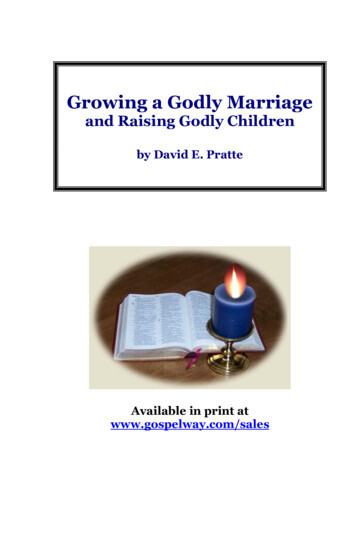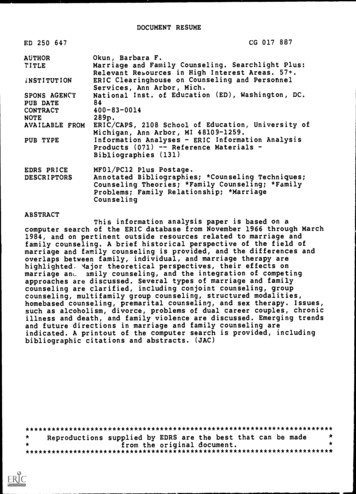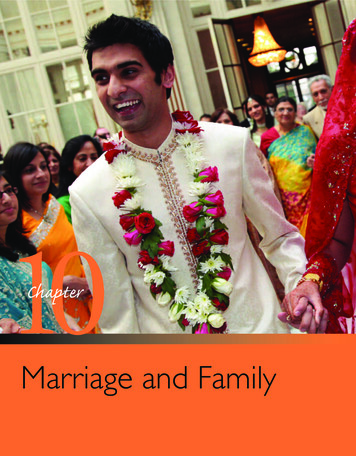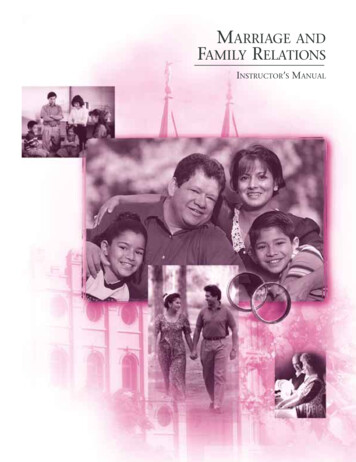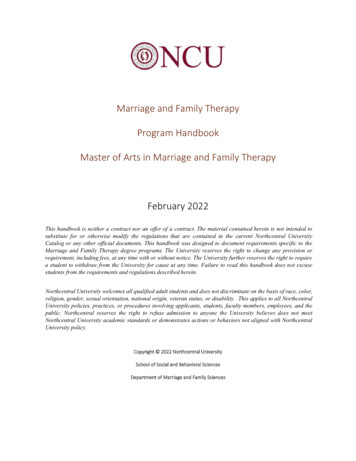
Transcription
Marriage and Family TherapyProgram HandbookMaster of Arts in Marriage and Family TherapyFebruary 2022This handbook is neither a contract nor an offer of a contract. The material contained herein is not intended tosubstitute for or otherwise modify the regulations that are contained in the current Northcentral UniversityCatalog or any other official documents. This handbook was designed to document requirements specific to theMarriage and Family Therapy degree programs. The University reserves the right to change any provision orrequirement, including fees, at any time with or without notice. The University further reserves the right to requirea student to withdraw from the University for cause at any time. Failure to read this handbook does not excusestudents from the requirements and regulations described herein.Northcentral University welcomes all qualified adult students and does not discriminate on the basis of race, color,religion, gender, sexual orientation, national origin, veteran status, or disability. This applies to all NorthcentralUniversity policies, practices, or procedures involving applicants, students, faculty members, employees, and thepublic. Northcentral reserves the right to refuse admission to anyone the University believes does not meetNorthcentral University academic standards or demonstrates actions or behaviors not aligned with NorthcentralUniversity policy.Copyright 2022 Northcentral UniversitySchool of Social and Behavioral SciencesDepartment of Marriage and Family Sciences
Table of Contents1 – INTRODUCTION . 8THE PROFESSION OF MARRIAGE AND FAMILY THERAPY. 8Overview of the MAMFT Program . 9Specializations within the MAMFT Program . 102 – MISSION AND PROGRAM OBJECTIVES . 11UNIVERSITY VISION, MISSION AND VALUES . 11DEPARTMENT OF MARRIAGE AND FAMILY SCIENCES MISSION, VISION AND GOALS. 11Department Mission . 11Department Vision . 11Department Goals . 11PROGRAM MISSION . 12GOALS AND OUTCOMES . 13Program Goals and Student Learning Outcomes . 13MAMFT PROGRAM ASSESSMENT . 153 – GENERAL PROGRAM POLICIES AND PROCEDURES . 17GENERAL PROGRAM POLICIES AND PROCEDURES . 17STUDENT RECRUITMENT POLICY . 17PROGRAM RETENTION POLICY . 17ANTI-DISCRIMINATION POLICY . 17POLICY/PROCEDURE – PROGRAM CLIMATE . 18ADMISSION POLICY . 18MINIMUM TECHNOLOGY REQUIREMENTS AND TRAINING . 19Technology Training . 19UNIVERSITY ORIENTATION. 20LICENSURE INFORMATION . 20PROGRAM PORTABILITY POLICY: STATE LICENSURE LIMITATIONS . 20RESPONSIBILITIES . 20SCOPE OF NOTIFICATION PROCESS . 21CONTINUED REQUIREMENTS AFTER ADMISSION. 21PROCEDURE: APPLICANTS WITH KNOWN LICENSURE LIMITATIONS . 21CONFIDENTIALITY POLICY AND STUDENT ACKNOWLEDGEMENT . 22TRACKING STUDENT PROGRESS. 24
ACADEMIC INTEGRITY . 25CODE OF CONDUCT POLICY . 25GRADE POLICY . 25STUDENT COMPLAINT AND GRIEVANCE PROCEDURES . 26UNIVERSITY COURSE POLICIES . 26GRADUATION POLICY . 27SATISFACTORY ACADEMIC PROGRESS . 27Program Probation . 28Resources Available to Students When Experiencing Difficulties . 28DISMISSAL FROM THE PROGRAM . 29APPEALS, GRIEVANCES AND CONCERNS. 29Escalation Procedures . 30Adjudication . 30EXIT INTERVIEW, ALUMNI, AND EMPLOYER EVALUATION SURVEYS . 30FACULTY AND STUDENT GOVERNANCE . 31Faculty Governance . 31Student Governance . 334 – ORGANIZATIONAL STRUCTURE AND PROGRAM FACULTY . 34FACULTY . 345 – GENERAL PROGRAM REQUIREMENTS AND RESOURCES . 35CREDIT HOUR REQUIREMENTS . 35TIME LIMITS FOR DEGREE COMPLETION . 35NOTIFICATIONS TO INTERNATIONAL STUDENTS . 35LICENSURE AND ACCREDITATION . 36Licensure Information . 36MEMBERSHIP IN THE AMERICAN ASSOCIATION FOR MARRIAGE AND FAMILY THERAPY . 36AAMFT ETHICAL CODE POLICY . 37LIABILITY INSURANCE . 37SSBS DIVERSITY AND COMMUNITY COMMITTEE . 37MFS PROGRAM ADVISORY COUNCIL . 38NORTHCENTRAL MFT STUDENT ASSOCIATION AND STUDENT ADVISORY COUNCIL . 38MARRIAGE AND FAMILY THERAPY HONOR SOCIETY . 39STUDENT SUPPORT SERVICES . 39
6 – CLINICAL TRAINING REQUIREMENTS . 40MAMFT CLINICAL TRAINING . 40MAMFT DEGREE PRACTICUM . 41MAMFT DEGREE INTERNSHIP . 41Clinical Requirements and Definitions . 41COVID-19 and Communicable Disease Policy . 44MFT PRACTICUM/INTERNSHIP SUPERVISOR QUALIFICATIONS . 44NCU Faculty Members . 44Local Clinical Supervisors . 44NCU MFT Faculty Local Clinical Supervisor Policy . 45CLINICAL TRAINING COURSES . 45Northcentral Online Practicum Sessions . 45Recording . 45Informed Consent . 46Technology Requirements . 46Logging Hours . 46AATBS Practice Test . 46Theory of Therapy Final Evaluation- Capstone . 47Final Case Presentation Policy . 477- PURSUING LICENSURE. 48OVERVIEW . 48EDUCATIONAL REQUIREMENTS . 48CLINICAL EXPERIENCE PREREQUISITES . 48LICENSURE APPLICATION, FEES, AND EXAMS . 49MEETING CURRICULUM REQUIREMENT FOR LICENSURE IN ARIZONA . 49RECRUITMENT OF STUDENTS AND FACULTY . 51APPENDICES . 53APPENDIX A – DIVERSITY, EQUITY, AND INCLUSION CURRICULUM MODEL . 53APPENDIX B – SELECT ADDITIONAL PROGRAM DOCUMENTS . 55APPENDIX C - CLINICAL PREPARATION PROCESS . 56APPENDIX D - FREQUENTLY ASKED QUESTIONS . 57APPENDIX E – NATIONAL EXAM TEST DOMAINS . 63
Dear Northcentral Marriage and Family Therapy Student,Welcome to Northcentral University’s Master of Arts in Marriage and Family Therapy (MAMFT) graduateprogram. We are pleased to welcome you as students and colleagues in the pursuit of knowledge in thefield of MFT. Northcentral University’s MAMFT Program holds the distinguished honor of being the firstever distance-based program to be accredited by the Commission on Accreditation for Marriage andFamily Therapy Education (COAMFTE). Since receiving accreditation, our MA Program has seenconsiderable growth. In addition to supporting student’s pursuit of meeting their state’s educationalrequirements that lead to obtaining their license as a marriage and family therapist, the MAMFT Programoffers a number of specializations. These specializations provide additional opportunities to learn moreabout specific populations and presenting problems you will likely address in clinical settings. ThisProgram Handbook has been developed to support your success as you begin and progress through yourstudies. We wish you the best and look forward to your participation in, and contribution to, the Masterof Arts in Marriage and Family Therapy Program at Northcentral University.Sincerely,Dr. Asha Sutton, LMFTProgram Director, MAMFT Programasutton@ncu.edu
Welcome to the Northcentral University Master of Arts in Marriage and FamilyTherapy Handbook You may use this online Help System to locate policy information and print individual handbooksections.To navigate using the sidebar to the left:Click one of the Chapter titles or an Appendix to see the topics in that portion of the manualClick a topic title to display that portion of the HandbookYou may also use the Search function to locate for a topic of interest.To print an individual topic, click the Print button while the topic is displayed.If you wish to print the entire Handbook, click on “Table of Contents/Print Version”.To return to the MFT Home Page, clink on “Back to MFT Site”.When receiving web-based links to the University Catalog, please be sure that you are viewing themost recent version of the catalog and outlined polices and procedures from the dropdown box.Throughout this Handbook, direct links are provided when possible. Note that links are subjectto change and it may be necessary to self-navigate websites to locate referenced information.Direct any question about the Handbook to the Office of the Dean, Dept. of Marriage and FamilySciences (mfs@ncu.edu).
1 – INTRODUCTIONThis handbook has been prepared to serve as a guide for students enrolled in the COAMFTE accreditedMaster of Arts in Marriage and Family Therapy (MAMFT) degree program at Northcentral University.University-wide rules and regulations can be found in the Northcentral University Catalog. The policies ofthis handbook are consistent with university policies and are intended to supplement, not replace,university policies and procedures. In addition, the educational and training protocols of the program aredesigned to conform to the Commission on Accreditation for Marriage and Family Therapy Education(COAMFTE) standards of training and practice, including the AAMFT Code of Ethics Conduct.Please read this handbook carefully, as you are expected to know this information. If you have anyquestions, please contact the Department Chair or Program Director of the Department of Marriage andFamily Sciences at mfs@ncu.edu. This document will be revised periodically to reflect necessaryprogrammatic changes that may occur due to changes in the profession, the University, licenserequirements or other relevant contexts. All policies, and any changes to these policies, shall be reviewedand approved by appropriate administrative personnel and will be communicated to students as needed.This handbook shall be distributed to the following named persons or groups of persons: 1) All facultymembers staff, and leadership associated with the MAMFT Program; 2) All graduate students both currentand entering the MAMFT degree program; and 3) The Dean of the School of Social and BehavioralSciences.THE PROFESSION OF MARRIAGE AND FAMILY THERAPYThe profession was launched as a number of psychologists and psychiatrists began to see limitations intreating most mental health issues using treatment approaches focused on individuals. It becameapparent to these women and men that treating whole families and combinations of family members(e.g., parents, couples) yielded positive results. From these initial observations and efforts, the field ofmarriage and family therapy (MFT) was born. The MFT field has now become a distinct mental healthdiscipline with its own body of theory, research, clinical techniques, and code of ethics. All fifty (50) statesand the District of Columbia currently have active legislation that governs the practice of MFT. Marriageand family therapists diagnose and treat problems from a systemic perspective. They work withindividuals, couples, families, and/or larger systems in a variety of contexts. The work of MFT focuses oninteractional and relational processes and seeks to build on the client’s strengths and resources. Marriageand family therapists help families address and change relationships and patterns of communication sothose families can find reasonable solutions to problems for themselves. There are many models ofpractice in MFT, and individual practitioners may vary greatly in the methods and techniques they use intheir clinical work.
Overview of the MAMFT ProgramNorthcentral University, a regionally accredited educational institution, uses distance-based (online)education as the predominant method of instruction and interaction for its degree programs. TheMAMFT program is housed within the Department of Marriage and Family Sciences (DMFS) whichis part of the School of Social and Behavioral Sciences. It is accredited by the Commission onAccreditation for Marriage and Family Therapy Education (COAMFTE), with the majority of thecoursework and training process conducted online. The exception to this is the clinical trainingcomponent, which is described later in this handbook.The MAMFT degree program is focused on developing the clinical skills, as well as the personal andprofessional growth, that are required for effective practice in the field of MFT. The program is designedto provide an integrated learning experience for adult students seeking specific training in the professionof MFT, exposing students to both modern and postmodern approaches. Students in this program willcritically analyze a broad range of theories and practical knowledge in MFT, utilize research, and applyprofessional standards of conduct. Degree requirements also include involvement in ongoing clinicalwork and supervision. This training prepares students for therapeutic and educational work in a varietyof settings including mental health centers, public service agencies, military service centers, and privatepractice. Graduates of the MAMFT program are well prepared to begin the process of seeking licensurein their home state, country, or area.The MAMFT program at Northcentral University is designed to meet general requirements for licensurewith opportunities for students to take additional courses beyond the 45 hours required for the degree,if needed, to meet specific requirements in their state, country, or area. This program has no residencyrequirement, allowing students to complete their program without having to relocate. In addition,students will complete clinical training in their local area with an approved local clinical supervisor whomeets state requirements for supervisors of MFT trainees. Students will also have interactive onlinesupervision sessions with an MFT clinical faculty member who works to support student success, duringthe clinical training and as a future professional.
Specializations within the MAMFT ProgramObtaining a specialization at the master’s level offers students the opportunity to focus their studies in aspecific content area. By focusing on this specialized area, students gain both content and applicationknowledge that enables them to become an “expert” in the particular area. Students in a specializationare required to complete two content courses, a research project focusing on issues related to thespecialization during their research course, and at least 50 hours of clinical experience in the specializationarea in an approved setting with a qualified local clinical supervisor.Students in the MAMFT program may elect to complete a specialization in one of the nine areas describedbelow. The program website and catalog provide further detail about each specialization. General Family TherapyMedical Family TherapyMilitary Family TherapyChild and Adolescent Family TherapyCouple TherapyLGBTQ Couple and Family TherapyTrauma-focused Systemic TherapySystemic Treatment of AddictionsSystemic Sex Therapy
2 – MISSION AND PROGRAM OBJECTIVESUNIVERSITY VISION, MISSION AND VALUESPlease visit the Course Catalog for our current Vision, Mission, and Values, which can be locatedon the About NCU page.DEPARTMENT OF MARRIAGE AND FAMILY SCIENCES MISSION, VISION AND GOALSDepartment MissionThe mission of the Northcentral University Department of Marriage and Family Sciences is to providepersonalized educational opportunities to students throughout the world that will allow them to acquire theknowledge, skills, and values integral to professional practice within the marriage and family sciences.Department VisionThe vision of the Northcentral University Department of Marriage and Family Sciences is toimprove the human condition by engaging a diverse community of faculty, staff and studentsthrough education, research and practice.Department GoalsThe Northcentral University Department of Marriage and Family Sciences promotes the development of: Specialized knowledge and skills in discipline-specific models and theoriesEthical professionalsCommitment to affirm and promote diversityResearch competencyPractical skills that positively impact individuals, families, and communities
PROGRAM MISSIONThe mission of the Marriage and Family Therapy Program is to prepare competent, ethical, culturallysensitive Marriage and Family Therapists. The program emphasizes a family systems perspective so thatclient processes, whether these clients are individuals, couples, or families, are contextuallyconceptualized. Faculty engage students in a one-on-one process that invites students to grow bothprofessionally and personally through the development of critical thinking skills, information literacy,important clinical skills, an appreciation for and knowledge of research through the scholar-practitionermodel, a valuing of diversity, and a lifelong commitment to learning and service.The broad goals of the MFT program are to:1. Provide the essential academic training needed to effectively practice marriage and familytherapy, including training in marriage and family therapy theory, research, major clinicalmodels, professional ethics, standards of best practice, and related issues with purposefulapplication of family systems theory across the curriculum.2. Train program participants in the scholar-practitioner model, including the ability toevaluate existing research and implement existing research into professional practice.3. Promote in students the application of critical thinking skills, including respect for and use ofcritical and creative thinking, skeptical inquiry, and a scientific approach to solving problemsrelated to behavioral, emotional, cognitive, and relational processes.4. Evaluate the readiness, professionalism, maturity, ethical adherence, skills, clinical insight,and competence of program participants, provide the coursework and clinical experiencerequirements necessary for provisional licensure as a marriage and family therapist in moststates or clinical membership in the American Association for Marriage and Family Therapy(AAMFT), and prepare and encourage individuals to continue their education in marriage andfamily therapy as a lifelong learner and/or at the doctoral level.5. Provide opportunities for students to prepare to be successful when taking any requiredlicensing examination to obtain a license to practice marriage and family therapy.6. Encourage personal growth, intellectual accomplishment, global awareness, and respect andappreciation for diversity.7. Prepare students to practice informed, respectful, and scholarly communication skillsin print and electronic media in clinical and academic venues.8. Provide and facilitate clinical training needed for competent and effective practice as aprofessional Marriage and Family Therapist, including the ability to assess, diagnose, and treatindividuals, couples and families with a wide variety of presenting issues including mental illnessas defined by the DSM-5.
GOALS AND OUTCOMESProgram Goals and Student Learning OutcomesThe missions of the institution and the program are directly associated to the program goals. Thegoals of the program are designed to evaluate students learning in the areas of diversity, practice,knowledge/research, and ethics. Each of these goals are directly related to the Student LearningOutcomes (SLO’s) and are linked to a single program outcome. The SLO’s are supported andmeasured based on benchmarks that allows the MAMFT program to assess the data and determinewhether the program is achieving the stated outcome.NCU Institutional Learning Outcomes – Master’s (ILOs), Program Goals, and Student/GraduateLearning Outcomes (SLO’s):NCU Institutional Learning Outcomes #1 (ILO) - Verbally provide scholarly beliefs, opinions, andconcepts across a wide range of contexts.NCU Institutional Learning Outcomes #2 (ILO) - Relate written scholarly beliefs, opinions, andconcepts across a wide range of contexts.NCU Institutional Learning Outcomes #3 (ILO) - Analyze interpretation, representation,calculation, application, and analysis of data and information in authentic contexts.NCU Institutional Learning Outcomes #4 (ILO) - Evaluate own and others’ assumptions andarguments.NCU Institutional Learning Outcomes #5 (ILO) - Determine resources needed in order tosupport a decision or address a problem.NCU Institutional Learning Outcomes #6 (ILO) - Determine requisite research skills to completeculminating experience for degree.Program Diversity Goal – Program will exhibit commitment to diversity through curriculumcontent and student composition.Program Practice Goal – Program will prepare students/graduates to demonstrate systemicclinical skills that positively impact individuals, families, and communities.Program Knowledge/Research Goal – Program will prepare students/graduates to haveexpertise in discipline-specific models and techniques that are informed by research.Program Ethics Goal – Program will prepare students/graduates to be knowledgeable of andpractice as ethical professionals.Program Research Goal – Program will prepare students/graduates to interpret scholarlyresearch for use in clinical practice and professional endeavors.
Student Learning Outcome #1 (SLO#1) -Students will employ competence in working withdiverse populations in clinical settings.Student/Graduate Learning Outcome #2 (SLO #2) –Students/Graduates will evalu
professional growth, that are required for effective practice in the field of MFT. The program is designed to provide an integrated learning experience for adult students seeking specific training in the profession of MFT, exposing students to both modern and postmodern approaches. Students in this program will
